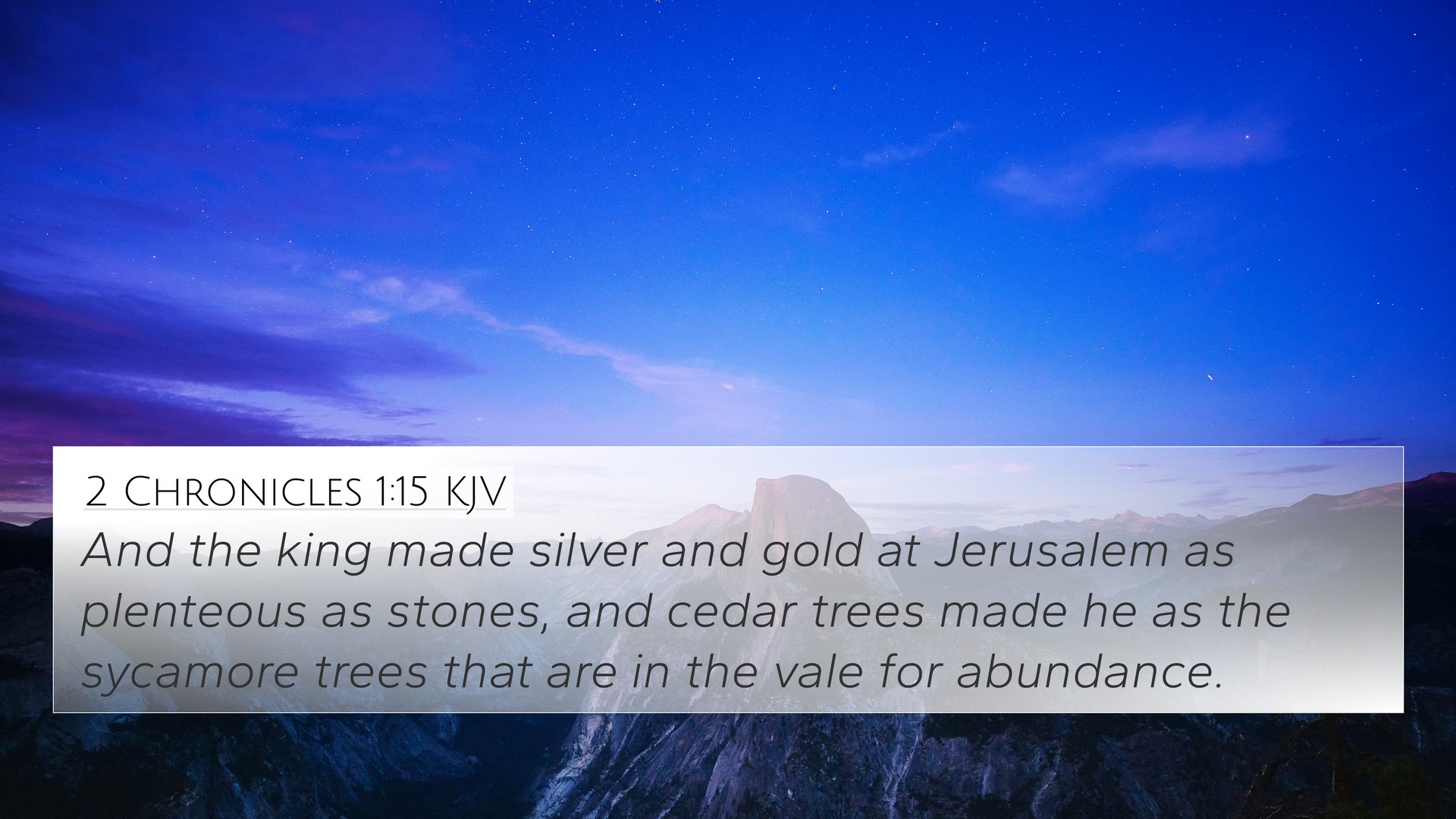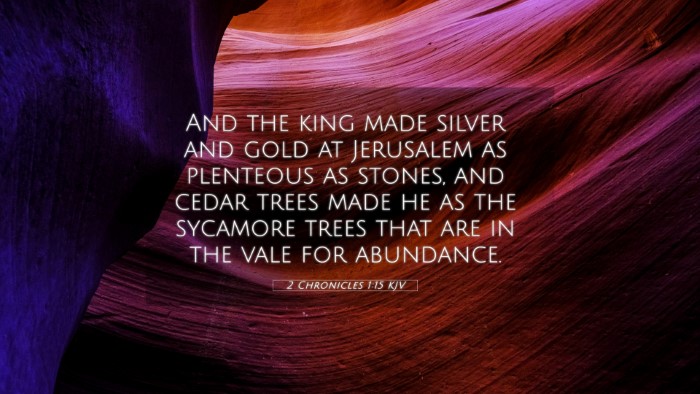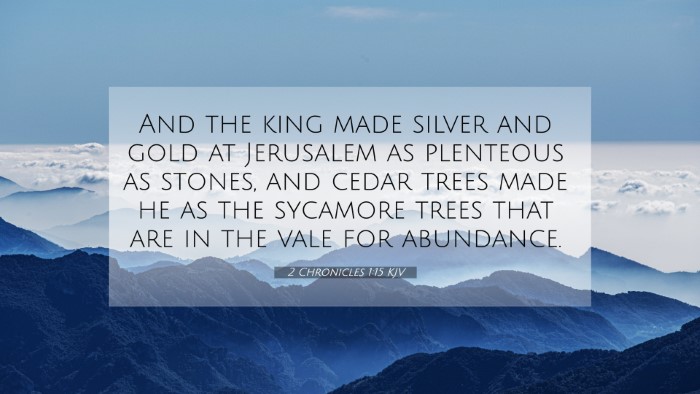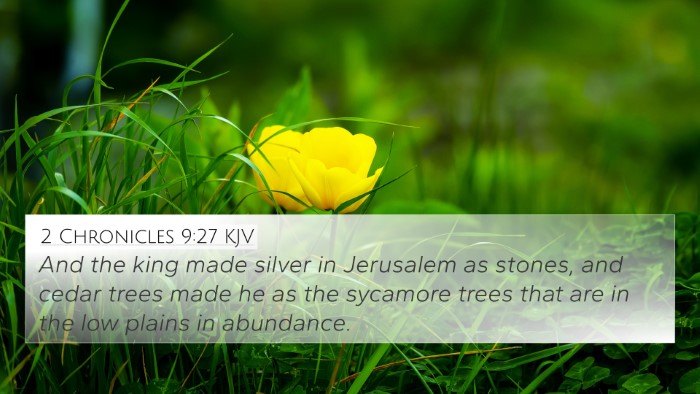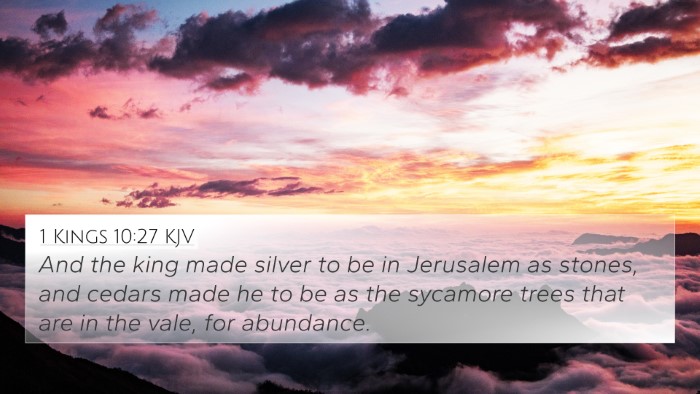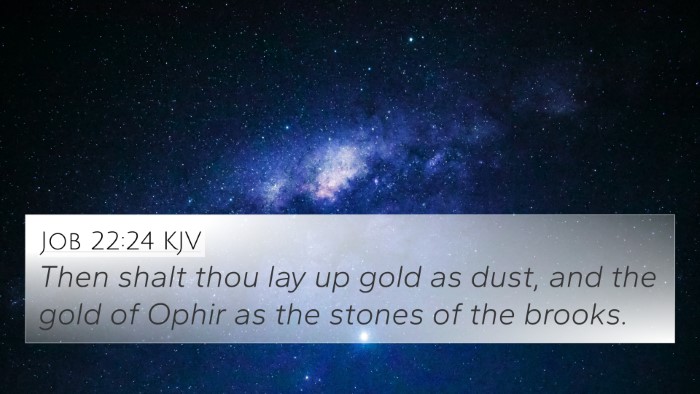Understanding 2 Chronicles 1:15
2 Chronicles 1:15 reads: "And the king made silver and gold as plentiful in Jerusalem as stones, and he made cedars as abundant as the sycamores that are in the lowland." This verse encapsulates the wealth and prosperity during King Solomon's reign, showcasing God's blessings upon his leadership.
Commentary Insights
Exploring the richness of this verse through public domain commentaries provides greater depth:
-
Matthew Henry's Commentary:
Henry highlights the significance of material wealth as a blessing from God under Solomon's rule. The abundance of silver and gold signifies not only economic prosperity but also the favor of God, reflecting a time of peace and stability.
-
Albert Barnes' Notes on the Bible:
Barnes emphasizes that King Solomon's wealth served a dual purpose. While it provided for the needs of the kingdom, it also allowed for the construction of the temple, signifying a spiritual richness that complemented the material wealth.
-
Adam Clarke's Commentary:
Clarke points out that the phrase “like stones” compares gold and silver to common stones, illustrating the extraordinary wealth that made precious metals seem trivial. This reflects the divine provision, suggesting God’s ability to lavish blessings beyond ordinary human measures.
Main Themes
- Divine Abundance: The verse emphasizes God's role in providing an overwhelming abundance to His people, showcasing an ideal kingdom.
- Material vs. Spiritual Wealth: The connection between prosperity and spiritual purpose is highlighted, indicating that material wealth can be a tool for divine service.
- Symbol of Peace: Prosperity is often connected with peace; Solomon's reign was marked by no wars, which allowed for wealth to multiply.
Cross-References to Explore
This verse connects with several other scriptures that help deepen the understanding of wealth and prosperity within a biblical context:
- 1 Kings 10:27 - Highlights the great wealth during Solomon’s reign.
- 2 Chronicles 9:27 - Offers details on Solomon's extraordinary wealth and resources.
- Psalms 112:3 - Discusses wealth that comes from fearing the Lord.
- Proverbs 10:22 - States that the blessing of the Lord brings wealth without trouble.
- Deuteronomy 8:18 - Reminds us that it is God who gives the power to obtain wealth.
- Job 36:11 - Suggests that obedience to God leads to prosperity.
- Matthew 6:33 - Instructs to seek first the kingdom of God and His righteousness, suggesting that material blessings follow.
Inter-Biblical Connections
The wealth during Solomon’s reign connects with multiple themes throughout both the Old and New Testament leading to an understanding of God’s providence and purpose:
- Wealth and Blessings: The narrative of wealth throughout the Old Testament often serves to illustrate God’s faithfulness to His covenant people.
- God’s Provision: Many biblical stories depict God's ability to provide for His people abundantly when they turn to Him.
- The Role of Godly Leadership: Solomon’s wealth is often tied to his wisdom and leadership in seeking God first, which is a recurring theme in scripture.
Using Cross-References for Deeper Study
To delve deeper into the meaning and implications of 2 Chronicles 1:15, utilizing tools for cross-referencing can greatly enhance understanding:
- Bible Concordance: A valuable resource for exploring themes related to wealth and blessings.
- Bible Cross-Reference Guide: This assists in identifying scriptures that discuss wealth in a spiritual context.
- Cross-Reference Bible Study: Facilitates a structured approach to comparing verses that discuss material and spiritual wealth.
- Bible Reference Resources: These provide insights on the cultural and historical context surrounding Solomon’s reign.
Conclusion
In conclusion, 2 Chronicles 1:15 offers profound insights into the nature of God's blessings upon His people during King Solomon's reign. Through exploring public domain commentaries and engaging in scriptural cross-referencing, readers can gain a nuanced understanding of the biblical principles associated with wealth, prosperity, and God's purpose.
